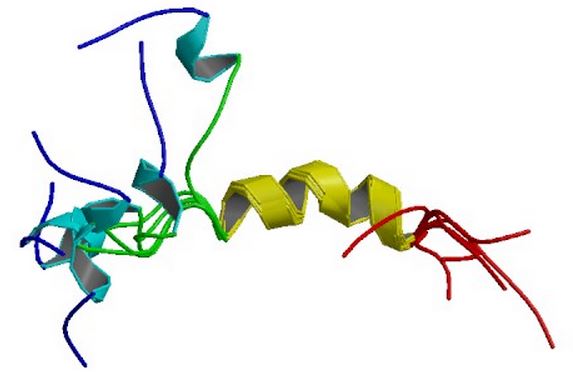parathyroid hormone-related protein
Cancer Cachexia: Might This Molecule Hold the Key?
Posted on by Dr. Francis Collins

Caption: Structure of parathyroid hormone-related protein (PTHrP), which has been implicated in cancer-related cachexia.
Source: The Protein Data Bank
No matter how much high-calorie food they eat or nutritionally fortified shakes they drink, many people with cancer just can’t seem to maintain their body weight. They lose muscle and fat, sometimes becoming so weak that they can’t tolerate further treatment. Called cachexia, this progressive wasting syndrome has long troubled patients and their families, as well as baffled scientists searching for ways to treat or perhaps even prevent it.
Some previous studies [1-3] have observed that humans and mice suffering from cachexia have “activated” brown fat. This type of fat, as I explained in a previous post, has the ability to convert its chemical energy into heat to keep the body warm. Intrigued by these hints, a team led by Bruce Spiegelman of the Dana-Farber Cancer Institute and Harvard Medical School in Boston recently decided to explore whether tumor cells might secrete molecules that spur similar brown fat-like activity, causing a gradual depletion of the body’s energy stores.
Share this:
- Click to share on LinkedIn (Opens in new window)
- Click to share on Pinterest (Opens in new window)
- Click to share on Tumblr (Opens in new window)
- Click to share on Reddit (Opens in new window)
- Click to share on Telegram (Opens in new window)
- Click to share on WhatsApp (Opens in new window)
- Click to print (Opens in new window)
